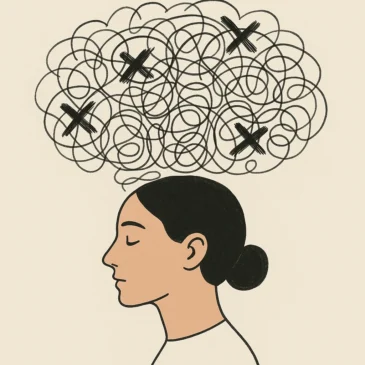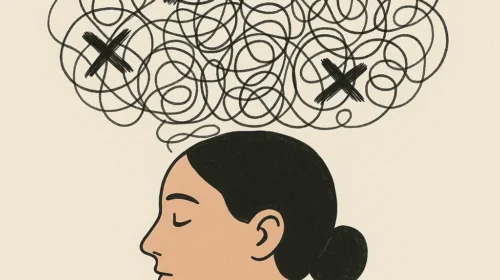Imagine lying in bed, the lights off, the room silent—yet your mind is buzzing with a thousand “what ifs.” You replay that awkward moment from three days ago. You rehearse tomorrow’s conversation six different ways. You spiral through every possible outcome of a simple decision.
Welcome to the exhausting world of chronic overthinking.
Overthinking isn’t just a habit—it’s a mental loop that can steal your peace, paralyze your decisions, and drain your energy. It’s a cycle many know all too well, yet few know how to escape.
Let’s take a closer look inside the mind of an overthinker—and how to find the way out.
The Hidden Patterns of Overthinking
To someone on the outside, overthinking can look like being “too sensitive” or “too analytical.” But inside, it feels more like mental quicksand.
Rachel, a 32-year-old nurse in Chicago, puts it this way:
“My brain doesn’t have an off switch. I can spend 20 minutes rereading a text before I send it. Then I worry about how it’ll be received. It’s like my thoughts double back on themselves constantly.”
Overthinkers tend to:
-
Analyze conversations long after they happen
-
Rehearse scenarios that may never occur
-
Struggle to make decisions, big or small
-
Fear making mistakes or disappointing others
This mental replay loop creates stress and keeps the brain in a heightened state of alert—even when nothing’s wrong.
Why Do We Overthink?
1. Fear of the Unknown
Overthinking is often a defense mechanism—an attempt to control what we can’t. If we can prepare for every possibility, we think, we won’t be caught off guard.
2. Perfectionism
When mistakes feel unacceptable, decisions become terrifying. Every option gets dissected for flaws, leading to decision paralysis.
3. Past Trauma or Embarrassment
Sometimes overthinking stems from past pain. If you’ve been humiliated, rejected, or blindsided before, your brain goes into overdrive trying to prevent a repeat experience.
4. High Sensitivity
Highly sensitive individuals tend to process things deeply, which can lead to more rumination. They notice nuances, emotions, and implications others might miss.
The Emotional Cost
Overthinking might seem harmless, even productive—but it takes a toll.
-
Sleep Loss: Racing thoughts at night make rest elusive.
-
Reduced Confidence: When you second-guess every decision, you start to doubt yourself.
-
Relationship Strain: Friends and partners can grow weary of constant reassurance-seeking or indecision.
-
Mental Fatigue: Constant inner chatter drains focus and clarity.
Jason, a software engineer in Seattle, shares:
“Sometimes I feel like my brain is always running background apps. I’m functioning, but I’m never fully at peace.”
How to Break the Cycle
1. Name the Pattern
Awareness is the first step. Notice when your thoughts start looping. Say to yourself, “This is overthinking. I don’t need to follow this spiral.”
2. Set a Time Limit
Give yourself a set amount of time to think something through—then move on. Use a timer if needed. Once time’s up, make a choice or table it.
3. Shift to Action
Overthinking thrives on inaction. Once you’ve thought through a decision, take a small step—even if it’s imperfect. Progress beats paralysis.
4. Practice “Good Enough” Thinking
Not every decision needs to be perfect. Sometimes, good enough is great. Ask: Will this matter in a week? A month? A year? If not, let it go.
5. Write It Out
Journaling helps release the loop. Get your thoughts out of your head and onto paper. Often, clarity follows.

6. Interrupt the Loop Physically
Go for a walk. Splash cold water on your face. Call a friend. Shifting your body can interrupt mental rumination and bring you back to the present.
7. Embrace Mindfulness
Mindfulness and meditation train your brain to observe thoughts without getting stuck in them. Even five minutes a day can help create space between you and your mental chatter.
Final Thought
Overthinking is a silent thief. It steals your time, peace, and confidence while masquerading as productivity. But it doesn’t have to rule your life.
You are not your thoughts. You are the awareness behind them.
With practice, patience, and self-compassion, you can break the cycle—and finally give your mind the rest it’s been craving.



